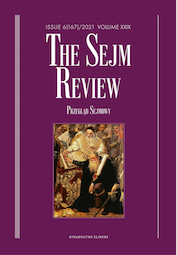Proces legislacyjny na sejmach w czasach Jana III Sobieskiego (1674–1696)
The Legislative Process at the Sejms during the Reign of Jan III Sobieski (1674–96)
Author(s): Robert KołodziejSubject(s): History, Political history
Published by: Kancelaria Sejmu
Keywords: Jan III Sobieski;Sejm;sejmiks;deputies’ marshal;legislative initiatives;constitutions;Commonwealth of Two Nations
Summary/Abstract: Out of a total of 12 Sejms which assembled during the reign of Jan III Sobieski (1674–96), half passed constitutions (laws). At that time the legislative initiative belonged predominantly to the monarch and the nobility (via sejmiks instructions), although other persons could also present projects of constitutions in the form of supplications. The king’s programme proposed in pre-Sejm documents was rather sparse, with Jan III attempting to avoid controversial points, which he promoted unofficially through the intermediary of the sejmiks, at which his adherents guarded the interests of the royal court. The distinctive feature of parliamentary work carried out during this period was a transference of the burden of the debate on the creation of law to the time of the conclusions (debates held by joint estates), which instead of the statutory five days lasted for as much as over ten weeks or more. For this reason participants in the debate included also senators and the king. The characteristic aspect of the debates as such was their extremely low efficacy – the outcome of the fact that particular constitutions had to be accepted by all persons attending the Sejm sessions and the increasingly frequent blocking of debates by members of particular political camps since absolute unanimity also as regards procedural issues remained binding. In 1679 the opposition managed to introduce an obligatory oath to be sworn by the marshal of the Sejm (speaker of the house) and constitution legislators (who edited the final texts of constitutions) – this was to limit the king’s influence in the Chamber of Deputies. The new regulation, however, did not produce actual benefits, and the scale of deceptions committed in the course of post-Sejm sessions held by the constitution deputation was much larger than in previous years. The last years of the reign of Jan III brought a progressive obstruction of Sejm debates, and in the 1690s resulted in the paralysis of this institution.
Journal: Przegląd Sejmowy
- Issue Year: 2021
- Issue No: 6
- Page Range: 141-169
- Page Count: 29
- Language: English, Polish

